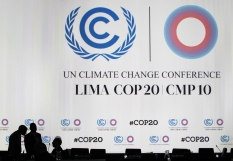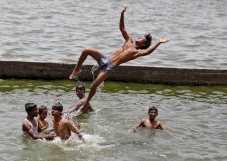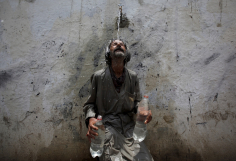More than 1,000 people have died in the southern Pakistani city of Karachi since weekend as the country struggled to cope with its worst heat wave in nearly 35 years, authorities said on Thursday.
Officials and aid workers reported morgues running out of space and heatstroke victims packing overstretched public hospitals.
More tents were erected on street corners where civilian and military personnel handed out iced water and rehydration salt to affected residents.
The heat wave in Karachi, which has a population of 20 million people, was made worse by rampant power interruptions due to a festering energy crisis, leaving many people without electric fans, water or light. It also struck at the beginning of the month of Ramadan when Muslims are forbidden from eating or drinking during daylight hours.
Some shops are refusing to sell ice or water during the day for fear of having to pay fines for breaking religious laws. With Ramadan prohibitions in effect, people are also forbidden from eating or drinking in public from dawn to dusk.
Temperatures in Karachi jumped to 44 degrees Celsius (111 Fahrenheit) at the weekend, the hottest since 1981. They eased to 38C (100F) on Thursday, but that was little consolation to millions of suffering residents.
Pakistani authorities are being blamed for their alleged mismanagement of the crisis. Protests have broken out in streets in many cities as the people vented their anger at provincial and central governments.
"We are continuously receiving people in a critical condition or dead," said Dr. Seemin Jamali, director of the Jinnah Postgraduate Medical Centre, noting that the hospital has seen 279 deaths so far. Morgues in the city are also filled to the full.
"Unfortunately, many victims were already unconscious when they were brought to our hospital in the past three or four days," said Seemi Jamali, a hospital spokesperson. "It was difficult to help them."
The return of southwesterly winds into Karachi and surrounding areas may lower temperatures, offering a hope of relief.
"The main cause [of the heat wave] is that the sea breeze was cut off, but the southwesterly wind has been flowing since yesterday afternoon and a bit of cloud cover has also come in," said Farooq Dar of the Pakistan Meteorological Department, based in Islamabad.
















